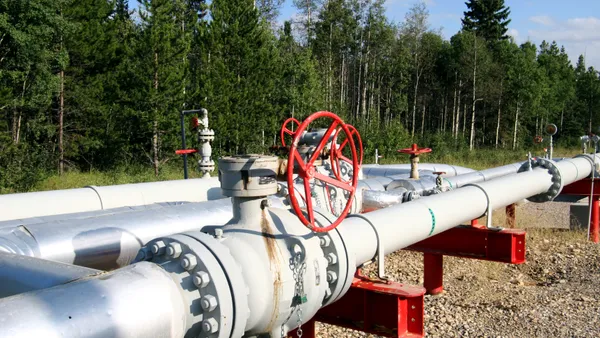Dive Brief:
- Initial bids for Westar Energy are due this week, according to Bloomberg, and the company has reportedly been courted by a wide range of potential investors, from Canadian investment companies to rival utility Ameren.
- Warren Buffett's Berkshire Hathaway has also been named as a potential suitor, with the Hillsboro Free Press reporting it is not the first time the billionaire investor has considered acquiring the utility.
- Speculation over a potential sale of Westar began last year, when utility President and CEO Mark Ruelle said the utility would consider the option. Westar serves about 700,000 customers in Kansas.
Dive Insight:
Bloomberg reports initial bids for Westar will be due this week, with the largest utility in the state valued at about $7 billion.
The company has 7,200 MW of electric generation, a mix of coal, nuclear, gas and wind, and has been growing its renewable portfolio. Speculation over a potential sale began in November, and appears poised to result in concrete bids.
Bloomberg reports several companies have shown interest, including Ameren Corp., Borealis Infrastructure Management Inc. and the Canada Pension Plan Investment Board. On the local side, the Hillsboro Free Press pegged Warren Buffett's Berkshire Hathaway as a potential bidder.
Buffett has history with Westar, the Free Press points out – the utility partnered with Berkshire Hathaway on the Prairie Wind Transmission system, along with Electric Transmission America.
Interest in Westar is part of a trend of consolidation in the industry, as larger utilities combat stagnant load growth through acquisitions, with Canadian companies particularly interested in snapping up U.S. assets.
Among deals announced earlier this year: Fortis announced it was purchasing ITC Holdings; Algonquin Power & Utilities Corp. said it was purchasing Empire District Electric Co.; and Emera announced a bid to acquire TECO Energy. All three are Canadian companies, and analysts at UBS Securities told Bloomberg that Canadian power players are drawn to the U.S. market due to high demand growth in certain regions and the financially viable regulatory model for U.S. utility companies.















